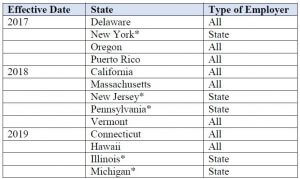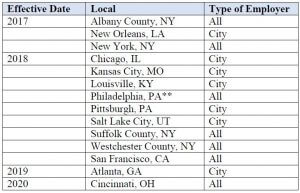
Earlier this month, Cincinnati joined the growing number of cities and states that have recently made it unlawful for private employers to inquire about or use an applicant’s salary history to make hiring or compensation decisions. The Cincinnati law, applicable only to employers located within city limits with 15 or more employees, will not become effective until next year, leaving plenty of time for those impacted to adopt new practices to be in compliance. But should employers outside of Cincinnati examine their own practices when it comes to inquiring about salary history?
Why A Salary History Ban?
It’s not unusual to see an application form (especially free ones found after a Google search) that includes a section seeking information about an applicant’s employment history like the one below. Employers want to learn about the applicant’s prior employers, periods of employment, job duties and responsibilities and, oops, there it is: salary.

Even if the application does not include a section about salary or pay rates, often times during the interview process, a hiring manager or recruiter might ask the applicant, “what is your current salary?” Typically, the reason for the question is so that the employer can get an idea of what offer will be attractive to the applicant. According to a 2018 survey by WorldatWork, 80% of managers responded that they relied on salary history to determine an offer that would be acceptable to a candidate.
It’s precisely that reason that many believe using salary history perpetuates salary inequities and the gender pay gap. US Census Bureau data shows that women in the United States are paid 80 cents for every dollar paid to men. The gap widens when broken down by race or ethnicity: African American women are typically paid 63 cents and Hispanic women are paid 54 cents for every dollar paid to men. So, when a female applicant responds to the salary question on the application or during the interview, her answer is likely to be less than what the male applicant's answer. Since the answer is likely to form the basis of an offer, the salary negotiation process is likely to start and end at a lower point for the female applicant than the male applicant and the gender gap persists.
Adoption by States & Local Jurisdictions
A growing number of jurisdictions believe that one solution to the gender pay gap is to prohibit employers from asking about or using a job candidate’s salary history and, in some cases, require employers to disclose the salary range for the position upon the applicant's request. The laws vary and, depending on the location, may apply only to public (e.g., state or city employers) or private employers of a certain size. Currently, twenty-five jurisdictions have some form of salary history ban in effect: five states and seven local jurisdictions prohibit only public employers from inquiring about an applicant’s salary history whereas eight states and five local jurisdictions broadly prohibit both public and private employers from doing the same.
* established through executive order
**Philadelphia’s ban on inquiring about salary history was ruled unconstitutional in part in Chamber of Commerce for Greater Philadelphia v. City of Philadelphia, 319 F. Supp.3d 773 (E.D. Pa. 2018) and is currently pending in United States Court of Appeals for the Third Circuit.
Employers in those jurisdictions with a salary history ban need to remove any questions about salary history from their application forms. And while those employers cannot ask about current or past salary, they can still ask the job applicant for her or his salary demand or desired salary range to determine if the applicant is within the salary range for the position available. Employers should educate hiring managers about the important difference between these two questions.
Regardless of their location, employers should consider whether they need a job applicant’s salary history in order to make a suitable offer. To attract and retain talent, employers probably only need to know 1) what the market pays for a particular job; 2) the applicant's skills, experience and qualifications; and 3) the applicant's target or desired salary. By focusing on these elements, employers can get ahead of a growing legal trend.
Contact us with questions about the salary history ban, your current application form or for information about our training programs for managers focused on interviewing and hiring.


